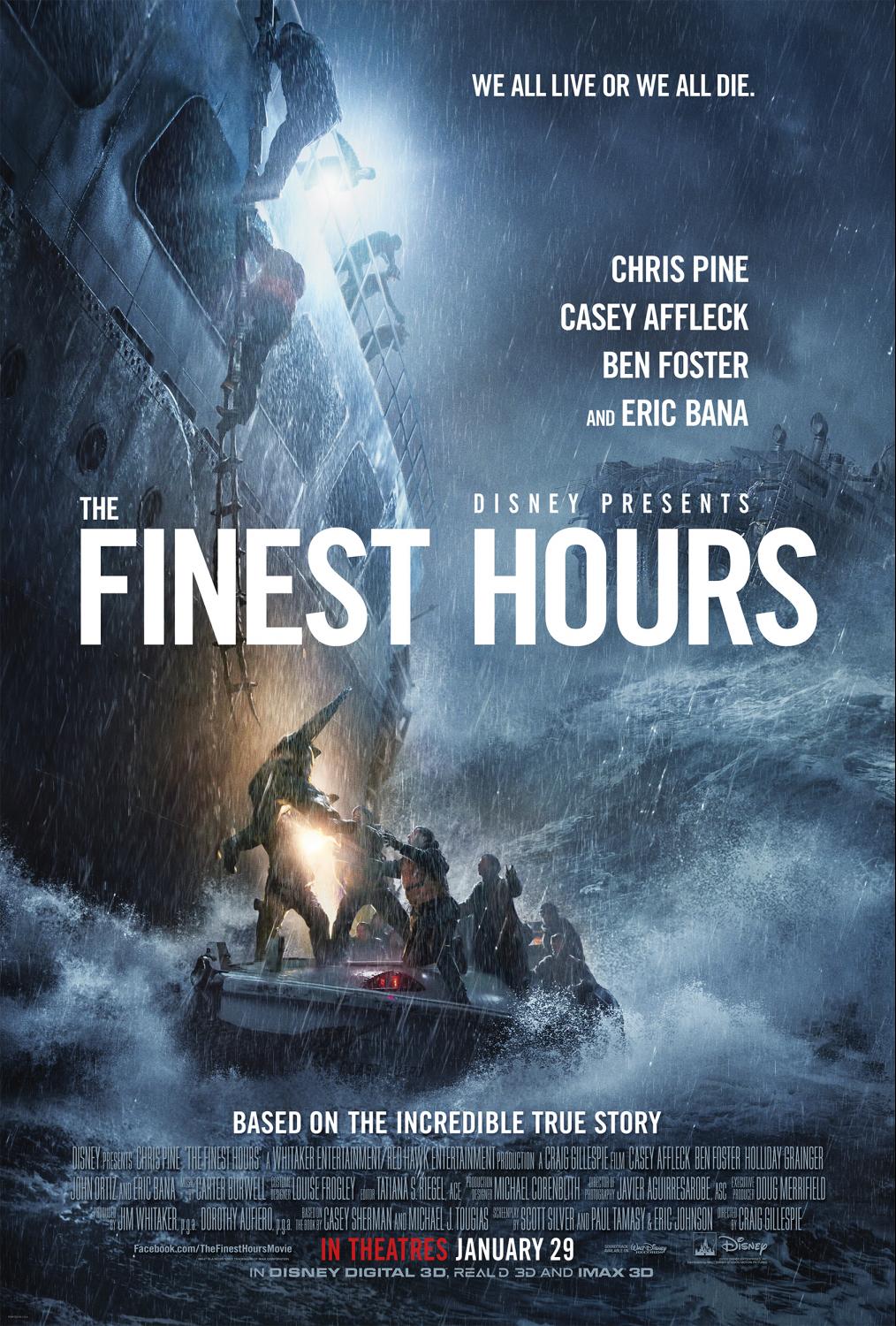Disney’s Finest Hours – Round Table Discussions
I attended a round-table event with some of the actors and the director of Disney’s “The Finest Hours” which opens in theaters Friday.
The film is derived from a true story about four United States Coast Guardsmen who take off into horrific weather on a “suicide mission” to try and find survivors of a sinking oil tanker. To this day it is still considered the greatest small boat rescue in Coast Guard history.
The round table discussions included:
- Craig Gillespie (Director)
- Chris Pine (Bernie Webber)
- Ben Foster (Richard Livesey)
- Holliday Grainger (Miriam Webber)
- Casey Affleck (Raymond Sybert)
The Director of the film is Craig Gillespie, known for a wonderful eclectic array of films such as “Lars and the Real Girl”, “Mr. Woodcock”, and “Fright Night”. When mentioned his variety on types of films he has directed his response was enjoyably candid.
GILLESPIE: “It confuses the hell out of the studios.”
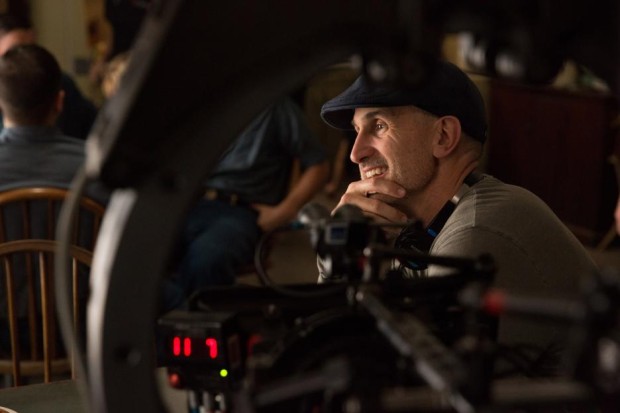
“The Finest Hours” fills you with an impressive amount of knowledge that only adds to the film and reels you in even more. Gillespie mentioned that throughout the film the biggest discussion was about the incredible amount of information being supplied to the audience and how to balance it.
GILLESPIE: “The best reference we had obviously was ‘Apollo 13.’ And my feeling was that sometimes as long as, you know, you stay true to what the technical stuff is people might not get all of it, but they got the performances let you know the reality of what’s going on.”
Besides the knowledge that you come away with after seeing this film, Gillespie had an interesting display of actors to work with.
GILLESPIE: Yes. [LAUGH] Honestly every actor has their own way of working. And it’s really I feel like you got to best serve them and make them comfortable. And Chris and Casey certainly had different styles and it’s really just sort of feeling what they need and you know where they need sort of encouragement or focus or what they’re feeling and it’s the same throughout all of them.
When it came to Casey Affleck (Raymond Sybert), he and Gillespie had an understanding of what his character should be like and that person was based on an image from a book.
CASEY AFFLECK: Craig and I talked about being kind of a librarian on an oil tanker and I think he was that kind of a guy. It doesn’t seem like he’s going to suddenly, you know, Clark Kent style rip his shirt off and just be like this bold, you know, like overtly all external gestures super hero kind of a dude. There’s a book that Craig and I – there was a painting that is the cover of a book, a John Williams book called “Stoner” and the cover of the book is a painting of a guy and I said this is the character, this guy here. And so it actually sounds like too simple to be useful, but it was really helpful because you go every time we get in an argument I would show the picture and go like no he’s like this, this, remember this guy? [LAUGH]
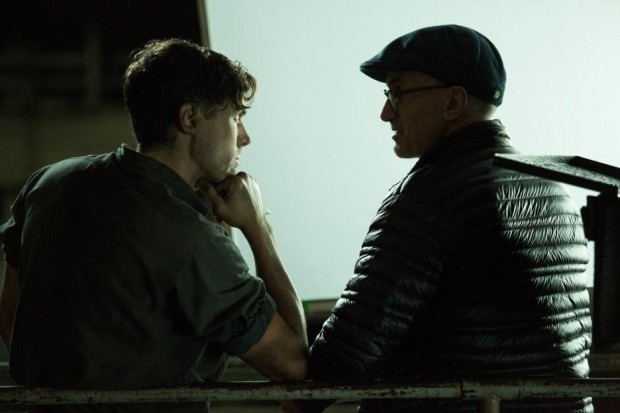
As far as Gillespie and Chris Pine (Bernie Webber), Gillespie had a different take on Chris’s character, one that Chris was on-board with.
CHRIS PINE: Yeah, when I first met Craig, he kept on mentioning Rocky as kind of the touchstone for the character. I thought that was a very adept, adroit perceptive way in. Especially how Scott wrote the script. He’s a kind of, he’s not the sharpest or swiftest guy in many ways, but he’s also very, very adept at his job. He knows that boat. He knows those waters and as much as he’s racked by fear and doubt, he does really know how to use his hands. His body. He’s a soft guy. He’s scared. He’s like a puppy dog. He wears his heart on his sleeve. He loves his woman. He’s just earnest. There’s no complexity above and beyond what you see with Bernie is what you get. I love that un-cynical throwback quality to him.

The relationship between Pine and Ben Foster (Richard Livesey) was an interesting on on-screen. It was a silent one for the most part and you felt as if there was some tension between the characters in the beginning but got a sense of admiration in the end. Foster had some really great feedback on his character.
BEN FOSTER: It’s as you said these are guys. These are guys who put others before them. It’s so humbling doing a job like this where you get the opportunity to spend time with the men and women of our military. So a guy who said, “Yeah, I’m gonna go on the boat even though everybody else is saying no.” That’s his job. That’s what he does. He’s not looking for a selfie. He’s not looking to tell all his friends what a brave guy he is on Twitter. He’s doing it because that’s his job and it’s the right thing to do.
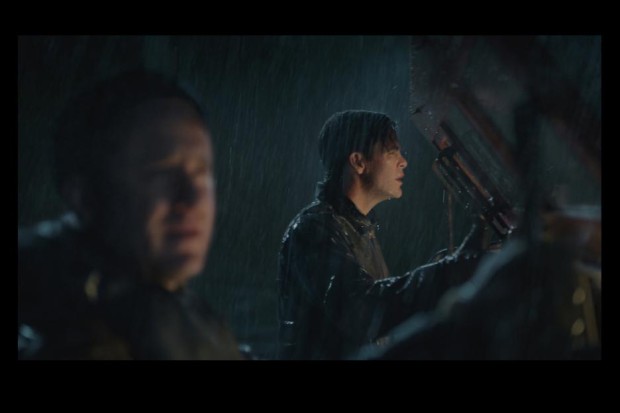
Gillespie had a whole different type of personality from the guys come on-board three weeks into shooting. Her name, Holliday Grainger (Miriam Webber). From the sound of it, a woman’s touch really does bring out the gentlemen in some people and once she arrived everyone seemed a lot nicer.
Grainger’s take on showing up in the middle of taping was beautifully spoken.
Grainger: I mean you’re always the central female character in a man’s world it feels like. [LAUGH] So it’s well practiced, well known. It was slightly intimidating the first day only because I had literally flown overnight from a job in Wales actually that I was shooting. So I had arrived on set quite jet lagged, slightly terrified about the accent and everyone had been working with the guys for like two months and so as soon as I walked on site I did feel like I was like a museum piece. Everyone was just – it was just like everyone all eyes on me. Like here’s a woman, there’s a girl, she’s got lipstick. She’s like – she’s in heels and a dress, what is this? [LAUGH]
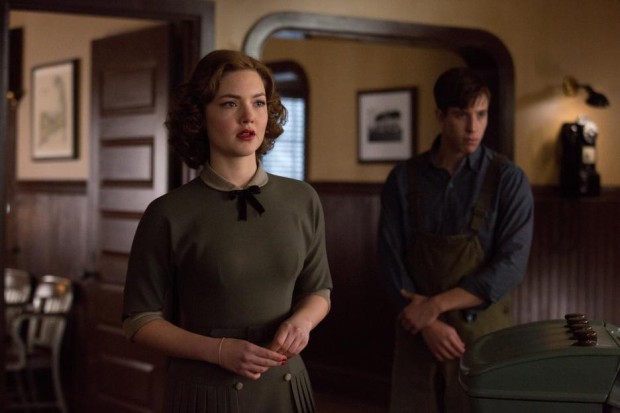
Holliday Grainger (Miriam Webber) character, while un-characteristically outspoken for the time was an important piece to this courageous story. Yet it is the love story between Miriam and Bernie that gets the movie-goer invested in the story about these courageous men.
GRAINGER: Well I guess, I mean, for me, I sort of, actually, when I first read it, I thought she was quite traditional in all her values and I suppose in the sense of she definitely has very strong traditional family values of wanting to get married and start a family and that’s very important for her. I think what maybe defies the time period is her lack of a care for social conventions. So I think for her it’s – I know it’s definitely what I love about the character of Miriam in this is that she and quite similar to Bernie in some ways. She’s very instinctive and very self assured and goes with what she feels is right. So, you know, when she wants to get married she feels it’s right so she’s gonna go for it. And if her fiancé is – if everyone’s saying, you know, he’s in danger; he’s about to be killed, this man doesn’t know what he’s doing, then I mean I don’t know if there’s a question in her mind she’s got to say something. And so I guess in that respect her kind of values are quite old fashioned, but her bravery is definitely something that I think is quite timeless. I think even now-a-days her self assurity would be quite – would be something to be respected.

